Knowledge of how long COVID-19 can survive on various surfaces is important in assessing the possible routes for transmission.
It is thought that skin transmission is just one of many potential routes although little is known about how long the virus can survive on the surface of not only skin or other surfaces. In a new study by a team from the Department of Infectious Diseases, Kyoto University, Japan, researchers used skin samples obtained from forensic autopsy samples, collected one day after death and found that the virus can survive for several hours but that it is quickly eliminated after washing with a disinfectant. The team used influenza virus (IV) for comparative purposes but also examined the survival of both viruses on several difference surface materials such as stainless steel, glass and polystyrene. The survival of the viral samples on these different surfaces were also examined after being mixed with mucus samples. In all cases, the samples were incubated at 25oC for 30 minutes and the content of both influenza and COVID-19 analysed.
Findings
The results showed that COVID-19 survived for considerably longer than IV on all tested surfaces. For example, IV survived for up to 11 hours on stainless steel compared to 85 hours for COVID-19. The virus also survived for a similar time on glass but for only 58 hours on polystyrene. In contrast, COVID-19 managed to survive for only 25 hours on stainless steel compared and for nearly 24 hours on glass when mixed with mucus. When directly in contact with human skin, COVID-19 survived for 9 hours compared to 1.82 hours for IV but this was reduced to only 4 hours when in mucus. However, mixing with 80% ethanol reduced COVID-19 survival time in mucus to less than 15 seconds.
Commenting on their findings, the authors noted that because COVID-19 can survive for up to 9 hours on human skin it poses a significant risk for transmission but the study also highlighted the importance of hand washing with ethanol which inactivated both COVID-19 and IV viral particles within less than 20 seconds.
Reference
Hirose R et al. Survival of SARS-CoV-2 and Influenza virus on the human skin: importance of hand hygiene in COVID-19. Clin Infect Dis 2020; https://doi.org/10.1093/cid/ciaa1517

